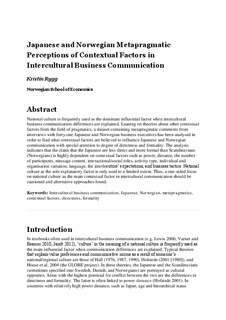Japanese and Norwegian Metapragmatic Perceptions of Contextual Factors in Intercultural Business Communication
Journal article, Peer reviewed
Permanent lenke
http://hdl.handle.net/11250/297344Utgivelsesdato
2015Metadata
Vis full innførselSamlinger
- Articles (FSK) [28]
Originalversjon
Journal of Intercultural Communication 2015, 38(July 2015)Sammendrag
National culture is frequently used as the dominant influential factor when intercultural business communication differences are explained. Leaning on theories about other contextual factors from the field of pragmatics, a dataset containing metapragmatic comments from interviews with forty-one Japanese and Norwegian business executives has been analysed in order to find what contextual factors are believed to influence Japanese and Norwegian communication with special attention to degree of directness and formality. The analysis indicates that the claim that the Japanese are less direct and more formal than Scandinavians (Norwegians) is highly dependent on contextual factors such as power, distance, the number of participants, message content, interactional/social roles, activity type, individual and organisation variation, language, the interlocutors’ expectations, and business tactics. National culture as the sole explanatory factor is only used to a limited extent. Thus, a one-sided focus on national culture as the main contextual factor in intercultural communication should be cautioned and alternative approaches found.
Beskrivelse
-This is the Author's version of this article.
